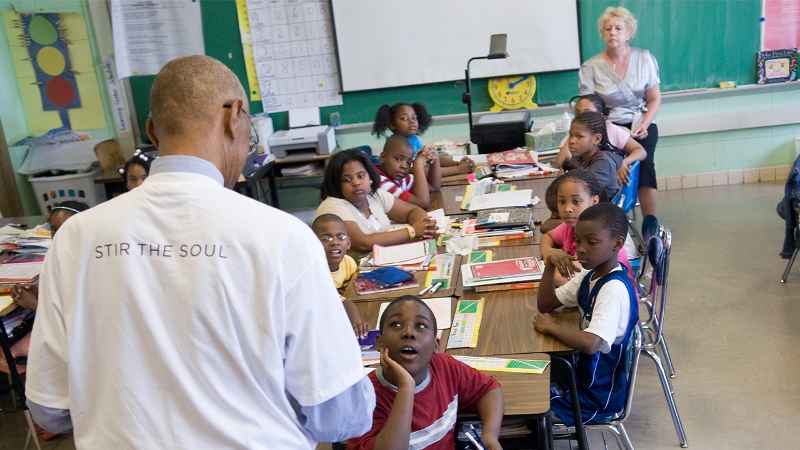Primary Science Tuition Singapore for Building Confidence in Science
Primary Science Tuition Singapore for Building Confidence in Science
Blog Article
Discover the Vital Advantages of Comprehending Main Scientific Research for Young Students
The significance of key science education and learning for young learners extends much beyond plain understanding procurement; it serves as a basic column in developing crucial skills such as essential thinking, analytic, and imagination. Involving with scientific principles through inquiry-based and interactive activities not only grows inquisitiveness yet likewise lays the foundation for resilient, positive learners.
Enhancing Essential Thinking Abilities
Cultivating crucial assuming abilities in young students is vital for their cognitive development and future academic success. Important reasoning enables kids to analyze info, review evidence, and make informed decisions, which are essential skills in today's information-rich culture. By taking part in scientific query, young students can boost these abilities as they discover principles through monitoring, thinking, and experimentation.
In main scientific research education and learning, educators can assist in essential reasoning by urging pupils to ask inquiries, create hypotheses, and carry out experiments. This hands-on method enables kids to practice analytical and develop sensible thinking abilities. When pupils explore the buildings of products or the principles of activity, they discover to evaluate their findings seriously and draw conclusions based on proof.
Additionally, conversations and collective projects can advertise important thinking by providing chances for learners to articulate their ideas, challenge presumptions, and think about diverse viewpoints. By producing an encouraging atmosphere that values questions and representation, teachers can support essential believing skills that encourage young learners to come to be lifelong students and independent thinkers. Eventually, boosting these skills lays a robust structure for their future academic undertakings and personal development.
Fostering Inquisitiveness and Expedition

Key scientific research education and learning supplies a structured environment where young learners can check out various phenomena via hands-on experiments and observations. By allowing them to connect with products and participate in inquiry-based understanding, instructors produce opportunities for youngsters to develop hypotheses, check their concepts, and reason. Such experiences support a sense of marvel and enjoyment about scientific research.

Structure Confidence in Issue Addressing
Structure confidence in problem-solving is an essential component of main science education that empowers young learners to approach challenges with resilience and creative thinking - primary science tuition Singapore. They develop necessary skills in essential reasoning and evaluation when kids are urged to engage with clinical concepts via hands-on tasks and inquiry-based discovering. This process not just enhances their understanding of scientific concepts but additionally cultivates a feeling of possession over their discovering
To click for more info build self-confidence, instructors ought to develop an encouraging environment where errors are viewed as chances for development instead of failures. This motivates pupils to take threats and explore different remedies to problems. By offering scaffolding and support, educators can help trainees browse intricate tasks, slowly boosting their freedom in problem-solving circumstances.
Moreover, collective knowing experiences, such as group jobs or experiments, can additionally improve trainees' confidence as they learn to articulate their thoughts and pay attention to others' viewpoints. These communications support social abilities and strengthen the idea that analytic is commonly a collective venture. Inevitably, growing confidence in problem-solving prepares young learners for future scholastic obstacles and furnishes them with the tools required for lifelong understanding.
Urging Creative Thinking and Advancement
In the world of key scientific research education and learning, dig this motivating creativity and innovation is crucial for growing a dynamic knowing atmosphere. By fostering a society where young learners can explore concepts and experiment freely, educators assist trainees establish crucial thinking abilities and an enthusiasm for exploration. Imagination in science urges kids to ask inquiries, create hypotheses, and take part in hands-on activities that boost their creativity.
Integrating flexible projects and inquiry-based discovering right into the educational program enables pupils to reveal their one-of-a-kind point of views and solutions. As an example, when entrusted with resolving a trouble pertaining to their setting, students can conceptualize multiple techniques, resulting in inventive results that display their originality. This not just grows their understanding of scientific principles but likewise infuses a feeling of ownership over their discovering procedure.
Furthermore, innovative scientific research education nurtures cooperation amongst peers, as students typically share concepts and improve each other's insights - primary science tuition Singapore. This joint spirit advertises not only development however likewise crucial social skills. Thus, by focusing on creativity and development in main scientific research education and learning, we encourage young learners to believe critically, embrace difficulties, and imagine opportunities, laying a solid structure for long-lasting understanding and expedition
Planning For Future Learning Obstacles
Young students' ability to navigate future learning challenges rests on a strong foundation in primary scientific research education and learning. This fundamental understanding outfits pupils with vital believing abilities and a methodical method to problem-solving, essential for tackling complex issues in an ever-evolving world. Key scientific research fosters inquiry-based knowing, encouraging students to ask questions, discover theories, and take part in hands-on experiments.
As they develop these abilities, students end up being click this site adept at analyzing information, acknowledging patterns, and drawing educated final thoughts. Such competencies are vital not just in scientific areas but also in design, mathematics, and modern technology (STEM), where interdisciplinary knowledge is significantly vital.
Furthermore, key science education and learning cultivates a feeling of curiosity and strength in young learners, allowing them to see obstacles as chances for development. As they experience and conquer barriers in their scientific expeditions, they develop confidence in their ability to adjust and innovate.
Ultimately, a strong foundation in key science not just prepares young students for academic quests yet also furnishes them with the devices necessary for lifelong knowing and adaptability in a quickly transforming global landscape. By spending in key science education, we are spending in the future capacity of our students.
Verdict
Comprehending main science is essential for young learners, as it promotes important reasoning, interest, and imagination. Ultimately, the benefits of key scientific research education prepare children for future academic pursuits and infuse long-lasting knowing practices important for thriving in an ever-evolving globe.
The importance of primary scientific research education and learning for young learners extends much beyond mere expertise purchase; it serves as an essential pillar in developing crucial skills such as important thinking, analytic, and imagination. By developing a helpful environment that values questions and reflection, instructors can nurture critical assuming skills that encourage young learners to become independent thinkers and long-lasting learners. Thus, by focusing on creativity and technology in main scientific research education and learning, we encourage young learners to assume critically, welcome challenges, and picture possibilities, laying a solid structure for lifelong understanding and exploration.
Young students' ability to navigate future understanding challenges pivots on a strong foundation in main scientific research education.Comprehending key science is vital for young learners, as it promotes essential reasoning, curiosity, and imagination.
Report this page